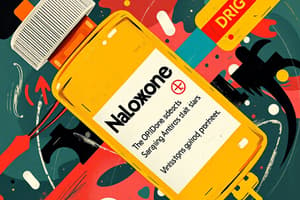Podcast
Questions and Answers
What is the objective of administering naloxone hydrochloride by sworn Sheriff's Office personnel?
What is the objective of administering naloxone hydrochloride by sworn Sheriff's Office personnel?
- To treat suspected opioid overdoses as outlined in Florida Statute § 381.887 (correct)
- To provide a substitute for emergency medical services
- To issue a warning to individuals suspected of opioid overdoses
- To render medical aid to individuals suspected of cocaine overdoses
What is the scope of this Standard Operating Procedure?
What is the scope of this Standard Operating Procedure?
- Only sworn Sheriff's Office personnel who have completed the required course of instruction (correct)
- All law enforcement personnel in the state of Florida
- All medical personnel in the state of Florida
- Only emergency medical services personnel
What is the purpose of providing naloxone hydrochloride to Sheriff's Office deputies?
What is the purpose of providing naloxone hydrochloride to Sheriff's Office deputies?
- To render medical aid to individuals suspected of cocaine overdoses
- To issue a warning to individuals suspected of opioid overdoses
- To enhance the effectiveness of medical aid to individuals suspected of opioid overdoses (correct)
- To provide a substitute for emergency medical services
What is an opioid overdose?
What is an opioid overdose?
What is an indicator of an opioid overdose?
What is an indicator of an opioid overdose?
What is the role of a Sheriff's Office deputy in relation to opioid overdoses?
What is the role of a Sheriff's Office deputy in relation to opioid overdoses?
What is naloxone hydrochloride?
What is naloxone hydrochloride?
What is the requirement for Sheriff's Office personnel to be issued naloxone hydrochloride?
What is the requirement for Sheriff's Office personnel to be issued naloxone hydrochloride?
What is the first action that Sheriff's Office deputies should take when arriving at the scene of a suspected opioid overdose?
What is the first action that Sheriff's Office deputies should take when arriving at the scene of a suspected opioid overdose?
Who should administer naloxone hydrochloride to the individual?
Who should administer naloxone hydrochloride to the individual?
What should be done if the individual's breathing does not return to normal after the initial dose of naloxone hydrochloride?
What should be done if the individual's breathing does not return to normal after the initial dose of naloxone hydrochloride?
What is the purpose of informing EMS that naloxone hydrochloride was used on the individual?
What is the purpose of informing EMS that naloxone hydrochloride was used on the individual?
What happens to individuals who regain consciousness after being revived from an opioid overdose?
What happens to individuals who regain consciousness after being revived from an opioid overdose?
What should be done with used naloxone hydrochloride dispensers?
What should be done with used naloxone hydrochloride dispensers?
Why should all individuals revived with the use of naloxone hydrochloride be encouraged to go to the hospital?
Why should all individuals revived with the use of naloxone hydrochloride be encouraged to go to the hospital?
What should be done if an individual refuses transport to the hospital after being revived with naloxone hydrochloride?
What should be done if an individual refuses transport to the hospital after being revived with naloxone hydrochloride?
What should be done with individuals who are facing criminal charges and were revived with naloxone hydrochloride?
What should be done with individuals who are facing criminal charges and were revived with naloxone hydrochloride?
What is the purpose of documenting the use of naloxone hydrochloride in a general offense report?
What is the purpose of documenting the use of naloxone hydrochloride in a general offense report?
Naloxone hydrochloride can only be administered by medical professionals.
Naloxone hydrochloride can only be administered by medical professionals.
Opioid overdose can only be caused by heroin.
Opioid overdose can only be caused by heroin.
Naloxone hydrochloride is only available in the form of an auto-injector.
Naloxone hydrochloride is only available in the form of an auto-injector.
An individual who has overdosed on opioids will always respond to voice or touch.
An individual who has overdosed on opioids will always respond to voice or touch.
Sheriff's Office deputies are required to have a medical background to administer naloxone hydrochloride.
Sheriff's Office deputies are required to have a medical background to administer naloxone hydrochloride.
Naloxone hydrochloride is only effective in treating opioid overdoses caused by prescription drugs.
Naloxone hydrochloride is only effective in treating opioid overdoses caused by prescription drugs.
An antagonist is a drug that enhances the effects of another drug.
An antagonist is a drug that enhances the effects of another drug.
All Sheriff's Office deputies are issued naloxone hydrochloride.
All Sheriff's Office deputies are issued naloxone hydrochloride.
Sheriff's Office deputies who respond to a suspected opioid overdose scene should ensure the safety of the scene and request the response of Fire Department.
Sheriff's Office deputies who respond to a suspected opioid overdose scene should ensure the safety of the scene and request the response of Fire Department.
If an individual does not have a pulse, CPR and an AED should not be used.
If an individual does not have a pulse, CPR and an AED should not be used.
Sheriff's Office deputies who have been issued naloxone hydrochloride and have successfully completed training on its use and administration should not administer it to the individual.
Sheriff's Office deputies who have been issued naloxone hydrochloride and have successfully completed training on its use and administration should not administer it to the individual.
A second dose of naloxone hydrochloride can never be given after the initial dose.
A second dose of naloxone hydrochloride can never be given after the initial dose.
The use of naloxone hydrochloride is a substitute for emergency medical care.
The use of naloxone hydrochloride is a substitute for emergency medical care.
Individuals revived from an opioid overdose will always be calm and cooperative.
Individuals revived from an opioid overdose will always be calm and cooperative.
Individuals who are revived with naloxone hydrochloride should not be encouraged to go to the hospital for further evaluation.
Individuals who are revived with naloxone hydrochloride should not be encouraged to go to the hospital for further evaluation.
Used naloxone hydrochloride dispensers should be destroyed by the Sheriff's Office deputy.
Used naloxone hydrochloride dispensers should be destroyed by the Sheriff's Office deputy.
The Sheriff's Office will not provide a course of instruction regarding the use of naloxone hydrochloride to sworn personnel.
The Sheriff's Office will not provide a course of instruction regarding the use of naloxone hydrochloride to sworn personnel.
A general offense report is not required when naloxone hydrochloride is used.
A general offense report is not required when naloxone hydrochloride is used.
Flashcards are hidden until you start studying
Study Notes
Purpose and Scope
- The purpose of this Standard Operating Procedure is to define guidelines governing the administration of naloxone hydrochloride by sworn Sheriff’s Office personnel.
- The objective is to treat suspected opioid overdoses and reduce injuries and fatalities when a Sheriff’s Office deputy arrives on scene before emergency medical services personnel.
- This procedure applies to sworn Sheriff's Office personnel who have successfully completed the required course of instruction on the administration of an emergency opioid antagonist, such as naloxone hydrochloride.
Definition and Discussion
- An antagonist is a drug that counteracts the effects of another drug.
- Naloxone hydrochloride (Naloxone/Narcan) is an emergency opioid antagonist that blocks the effects of opioids administered from outside the body and is approved by the United States Food and Drug Administration for the treatment of opioid overdose.
- Opioid overdose is the ingestion of an excessive dose of heroin or opiate-based prescription drugs, with indicators including the patient not waking up, not responding to voice or touch, breathing is very slow, irregular, or has stopped, “pinpoint pupils,” and/or abnormally low heart rate or blood pressure.
Procedure
- Only Sheriff’s Office deputies who have completed the required course of instruction shall be issued naloxone hydrochloride.
- Deputies who are the first to arrive at the scene of a suspected opioid overdose shall ensure the safety of the scene and request the response of Emergency Medical Services (EMS) via the Communications Bureau.
- Deputies shall perform an assessment of the individual and determine what medical services may be needed.
- If the individual does not have a pulse, CPR and an AED should be used.
- If a pulse is present, naloxone hydrochloride shall be administered as quickly as possible.
- A second dose of naloxone hydrochloride may be given after 2-3 minutes if the individual’s breathing does not return to normal or if breathing difficulty resumes.
- After the use of naloxone hydrochloride, deputies should be prepared for an unpredictable and potentially violent response from the individual.
Additional Information
- The use of naloxone hydrochloride is not a substitute for emergency medical care.
- EMS must still respond regardless of the individual’s apparent condition following the use of naloxone hydrochloride.
- All individuals revived with the use of naloxone hydrochloride should be encouraged to go to the hospital for further evaluation.
- If the individual refuses transport to the hospital, they should be evaluated for a Marchman Act to determine if involuntary examination is needed.
- Used naloxone hydrochloride dispensers can be given to EMS personnel for disposal or disposed of as normal refuse.
- When naloxone hydrochloride is administered, the Sheriff’s Office deputy shall originate a general offense report and document its use and results.
Training
- The Sheriff's Office will provide a course of instruction regarding the use of naloxone hydrochloride to all approved sworn personnel.
Purpose and Scope
- The purpose of this Standard Operating Procedure is to define guidelines governing the administration of naloxone hydrochloride by sworn Sheriff’s Office personnel.
- The objective is to treat suspected opioid overdoses and reduce injuries and fatalities when a Sheriff’s Office deputy arrives on scene before emergency medical services personnel.
- This procedure applies to sworn Sheriff's Office personnel who have successfully completed the required course of instruction on the administration of an emergency opioid antagonist, such as naloxone hydrochloride.
Definition and Discussion
- An antagonist is a drug that counteracts the effects of another drug.
- Naloxone hydrochloride (Naloxone/Narcan) is an emergency opioid antagonist that blocks the effects of opioids administered from outside the body and is approved by the United States Food and Drug Administration for the treatment of opioid overdose.
- Opioid overdose is the ingestion of an excessive dose of heroin or opiate-based prescription drugs, with indicators including the patient not waking up, not responding to voice or touch, breathing is very slow, irregular, or has stopped, “pinpoint pupils,” and/or abnormally low heart rate or blood pressure.
Procedure
- Only Sheriff’s Office deputies who have completed the required course of instruction shall be issued naloxone hydrochloride.
- Deputies who are the first to arrive at the scene of a suspected opioid overdose shall ensure the safety of the scene and request the response of Emergency Medical Services (EMS) via the Communications Bureau.
- Deputies shall perform an assessment of the individual and determine what medical services may be needed.
- If the individual does not have a pulse, CPR and an AED should be used.
- If a pulse is present, naloxone hydrochloride shall be administered as quickly as possible.
- A second dose of naloxone hydrochloride may be given after 2-3 minutes if the individual’s breathing does not return to normal or if breathing difficulty resumes.
- After the use of naloxone hydrochloride, deputies should be prepared for an unpredictable and potentially violent response from the individual.
Additional Information
- The use of naloxone hydrochloride is not a substitute for emergency medical care.
- EMS must still respond regardless of the individual’s apparent condition following the use of naloxone hydrochloride.
- All individuals revived with the use of naloxone hydrochloride should be encouraged to go to the hospital for further evaluation.
- If the individual refuses transport to the hospital, they should be evaluated for a Marchman Act to determine if involuntary examination is needed.
- Used naloxone hydrochloride dispensers can be given to EMS personnel for disposal or disposed of as normal refuse.
- When naloxone hydrochloride is administered, the Sheriff’s Office deputy shall originate a general offense report and document its use and results.
Training
- The Sheriff's Office will provide a course of instruction regarding the use of naloxone hydrochloride to all approved sworn personnel.
Studying That Suits You
Use AI to generate personalized quizzes and flashcards to suit your learning preferences.





